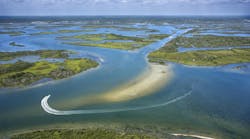Court Brief Filed in U.S. Supreme Court Groundwater Case
The Water Systems Council (WSC) and the National Ground Water Assn. (NGWA) filed an amici curiae (friends of the court) brief in a case currently pending in the U.S. Supreme Court, according to PR Newswire.
In the case, County of Maui, Hawaii v. Hawaii Wildlife Fund, the court will decide if the Clean Water Act requires a permit when pollutants originate from a point source but are conveyed to navigable waters by a nonpoint source, such as groundwater.
Maui County is injecting wastewater into injection wells near the ocean, according to PR Newswire. The injected wastewater is added to groundwater, some of which makes its way into the ocean.
The court will negotiate whether this discharge requires a National Pollution Discharge Elimination System (NPDES) permit. According to PR Newswire, a permit is required if a discharge is added directly to navigable waters; however, lower courts in the judicial system are split on whether a permit is required in this particular situation. In the case of County of Maui, the U.S. Court of Appeals for the Ninth Circuit found that an NPDES permit was needed.
The brief argues that “the release of pollutants by Maui County is covered by the nonpoint source provisions contained in 33 U.S.C. § 1329 of the Clean Water Act.”
“Applying the NPDES provisions in the Clean Water Act to releases to groundwater would disrespect the clear structure of the act and prove difficult in practice,” the brief said.
According to the WSC/NGWA brief, if any groundwater releases require NPDES permits, releases should be limited to groundwater that flows in identifiable channels.
“State water rights often depend on the distinction between percolating groundwater and groundwater in identifiable channels,” the brief said.


